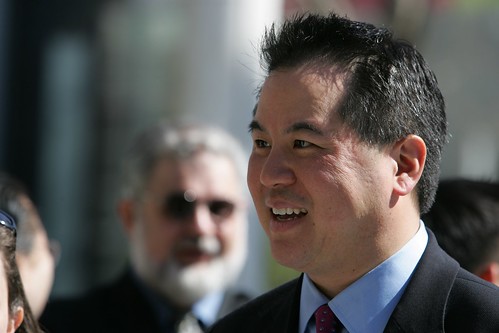In San Francisco, great policy still isn’t always enough. Sometimes we need public support to help our friends and colleagues in city government make the right choices.
That’s why the Sierra Club and many others are rallying this morning at San Francisco City Hall at 9:30 AM today (Thursday, May 18) in support of GoSolarSF – the pioneering local solar incentive program that has helped more than quadruple the number of solar roofs in San Francisco in just three short years.
GoSolarSF is creating green jobs, attracting new green industries, helping fight climate change and helping to make our nation more energy independent.
All of that – and a new study that shows adding solar pays for itself by increasing the value of homes. That means that the GoSolarSF program is more than paying for itself in the long run with higher tax revenues captured from the higher valuations of solar homes (once the homes are sold, assessments don’t go up for those who install solar).
So what’s the catch?
Beats me.
But for some reason the SF Public Utilities bureaucracy is digging in their heels – trying to dramatically cut one of San Francisco’s most effective environment efforts and economic development initiatives.
Part of the resistance might just be cultural. The SFPUC is the old water department and its focus is still mostly on tunnels and trenches – not renewables.
But whatever is motivating the resistance – we need to spread the word that San Francisco should continue to fully fund this important and highly regarded program. Just a few facts to consider:
• GoSolarSF has helped Increase the number of rooftop solar energy systems installed in San Francisco from approximately 500 to 2385
• It has helped drive down the installed cost of solar power by 25% by creating more competition and scale in the solar installation sector
• The program attracted over 30 solar companies and organizations to San Francisco and established the City as a solar power leader.
• GoSolarSF has created or retained hundreds of new jobs
• And the solar projects promoted by GoSolarSF are installed at about 10% of the cost of what it would otherwise be if the City had to own the systems outright (a small GoSolarSF incentive unlocks a much larger private customer investment in the SF economy)
With all of the clear-cut benefits associated with the program, it shouldn’t be anywhere near the SFPUC chopping block. GoSolarSF has clearly demonstrated an ability to get San Francisco more while paying less – and that’s the type of program we should be supporting during these challenging fiscal times. Eliminating or reducing a program that is paying for itself in the long run just doesn’t make sense.
If you are in San Francisco this morning – come support this important program at City Hall. Or sign our petition in support of GoSolarSF.

